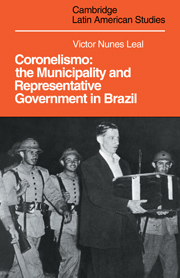Book contents
- Frontmatter
- Contents
- Editor's note
- Introduction by Alberto Venancio Filho
- A note on the term coronelismo
- 1 Notes on the structure and functioning of coronelismo
- 2 Powers of the municipalities
- 3 The elective principle in municipal administration
- 4 Municipal revenue
- 5 Organisation of the police and the judiciary
- 6 Electoral legislation
- 7 Conclusion
- Notes
- Bibliography
2 - Powers of the municipalities
Published online by Cambridge University Press: 05 October 2010
- Frontmatter
- Contents
- Editor's note
- Introduction by Alberto Venancio Filho
- A note on the term coronelismo
- 1 Notes on the structure and functioning of coronelismo
- 2 Powers of the municipalities
- 3 The elective principle in municipal administration
- 4 Municipal revenue
- 5 Organisation of the police and the judiciary
- 6 Electoral legislation
- 7 Conclusion
- Notes
- Bibliography
Summary
Quantitative concept
It is an extremely difficult task to determine exactly what, within a good administrative structure, should be municipal prerogatives. Observations of a very general nature shed little light on the subject. When one says, for example, that the municipality should assume functions of a local nature or those which affect its own particular interests, there still remains the problem of defining what are these particularly local functions and interests. The difficulty increases when one observes that certain matters which formerly concerned the life of only one municipality may now be the concern of several, or of a whole state, or even the whole country. This variation in time of the territorial area affected by a large number of administrative problems, makes the idea of ‘the municipality's particular interest’ or ‘local interest’ a very relative one, and makes it more difficult to find a solution based on general principles.
For the rest, it is not the intention of this work to discuss what would or would not be an ideal type of municipal authority, but simply to seek to understand certain aspects of municipal power as we have known it in reality. In this sense the most important thing is to demonstrate how the municipality's sphere of influence has been widened or restricted, comparing the various phases one with the other and not with some model erected a priori as a definitive standard of measurement.
- Type
- Chapter
- Information
- CoronelismoThe Municipality and Representative Government in Brazil, pp. 25 - 51Publisher: Cambridge University PressPrint publication year: 1977



